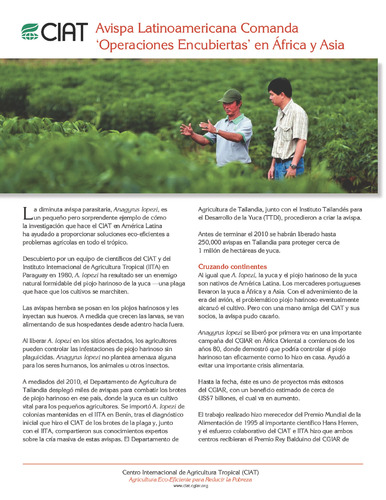Latin American wasp spearheads ‘sting‘ operations in Africa and Asia = Avispa Latinoamericana comanda ‘operaciones encubiertas en África y Asia
The tiny parasitic wasp, Anagyrus lopezi, is a small but striking example of how CIAT's Latin American research has helped to provide eco-efficient solutions to agricultural problems across the tropics. Discovered by a team of CIAT and IITA scientists in Paraguay in 1980, A. lopezi has proved to be a formidable natural enemy of the cassava mealybug - a pest that causes cassava crops to shrivel. The female wasps home-in on mealybugs, injecting them with their eggs. As the larvae grow they eat the hosts from the inside out. By releasing A. lopezi in affected sites, farmers can control mealybug infestations without pesticides. Anagyrus lopezi poses no threat to humans, animals, or other insects. In mid-2010, thousands of the wasps were deployed by the Thai Department of Agriculture (DoA) to combat mealybug outbreaks in the country, where cassava is a vital smallholder crop. They imported A. lopezi from colonies kept at IITA in Benin. CIAT provided initial diagnosis of the mealybug outbreaks, and together with IITA, shared expertise on mass rearing. The DoA, together with the Thai Tapioca Development Institute (TTDI), then reared the wasp.

